Look up free Oregon divorce records as part of court data accessible to the public due to the state’s Public Records Law and the Federal Freedom of Information Act (FOIA).
The public needs divorce records for various reasons, including verifying someone’s marital status, settling immigration and financial matters. Regardless of the purpose, citizens can acquire these records through state, county and local public agencies at a nominal cost or even for free.
Interested persons can search for these records without needing to find the county and agency that has custody of the documents; this proves helpful if the location of the divorce is unknown. Learn more about tracking down divorce information in Oregon below.
Are Divorce Records Considered Public Records in Oregon?
Divorce records in Oregon are partly considered part of public data because the public can only access these documents when 50 years have elapsed since the record date.1 In cases like this, citizens can request non-certified copies of these records.
Outside this time frame, divorce records are confidential; only authorized individuals may request certified copies of dissolution documents as per Oregon Statute ORS 432.380 (2)(c)(B)(v)—these include the registrant, immediate family members such as parents, brothers, children over the age of eighteen and legal authorized representatives.
There are two types of documents associated with divorces; decrees issued when granting a dissolution and certificates that are certified documents issued by the State Registrar. Anyone can view divorce records generated by circuit courts.2 The only exception to this is records sealed by the courts.
Additionally, interested persons have the option of contacting third party vendors who operate within state and county laws. These companies can retrieve divorce records for a fee regardless of where the documents are generated. This can provide an element of privacy for individuals who may not want to connect directly with public agencies.
Regardless of the accessibility of dissolution records in Oregon, divorce rates are publicly available. These rates are recorded by several public agencies, a notable one being the Centers for Disease Control & Prevention. As of 2021, Oregon has among the lower dissolution rates in the country—it has a rate of 2.7 divorces per 1000 persons.
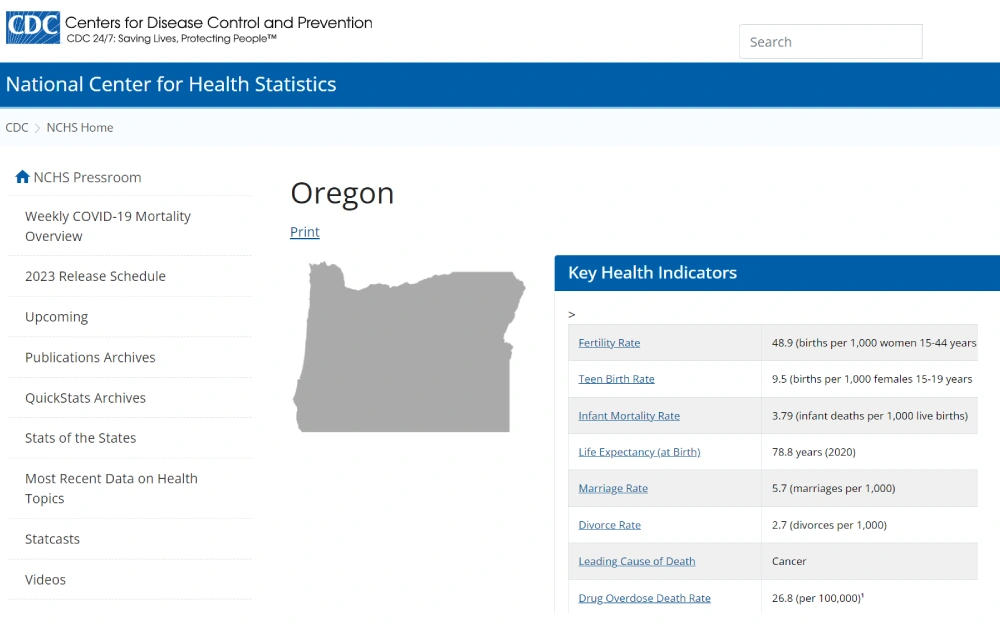
These rates are representative of general data and do not single out special segments such as same sex marriages. In addition, interested persons can see individual divorce counts in each county in Oregon from 1995-2021—information is provided by the Oregon Health Authority.
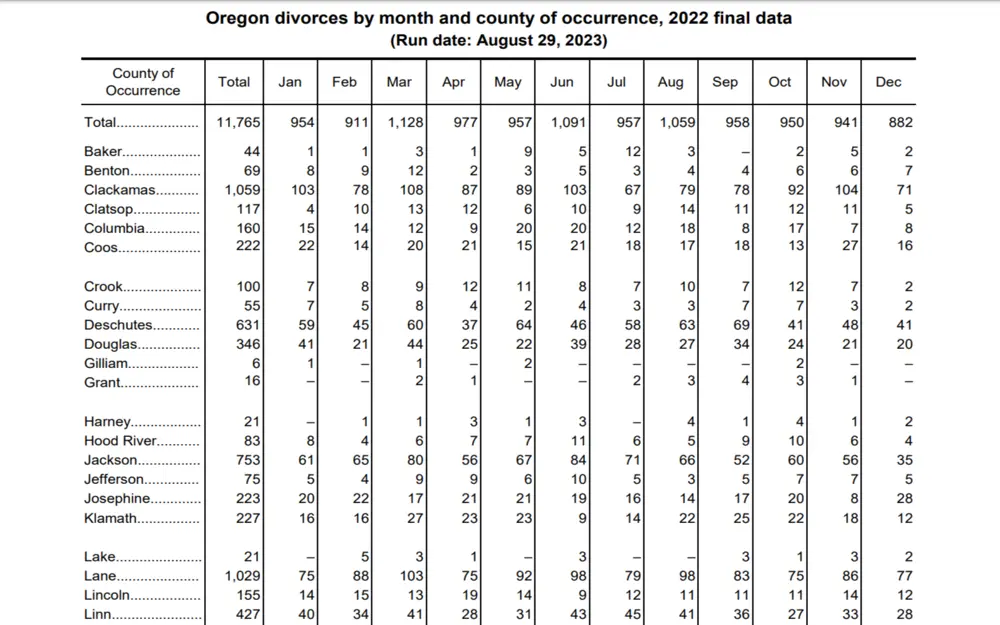
How To Look Up Oregon Divorce Records & Ex-Spousal Information
Interested persons who need to find divorce records may turn to Oregon’s state agencies—in particular, they will need to contact the state’s Health Authority.5
As mentioned earlier, only authorized persons may request copies of certified divorce records. However, persons who are not eligible to request certified copies of divorce certificates can send a note granting permission via a notarized signature (Spanish) from an authorized individual.
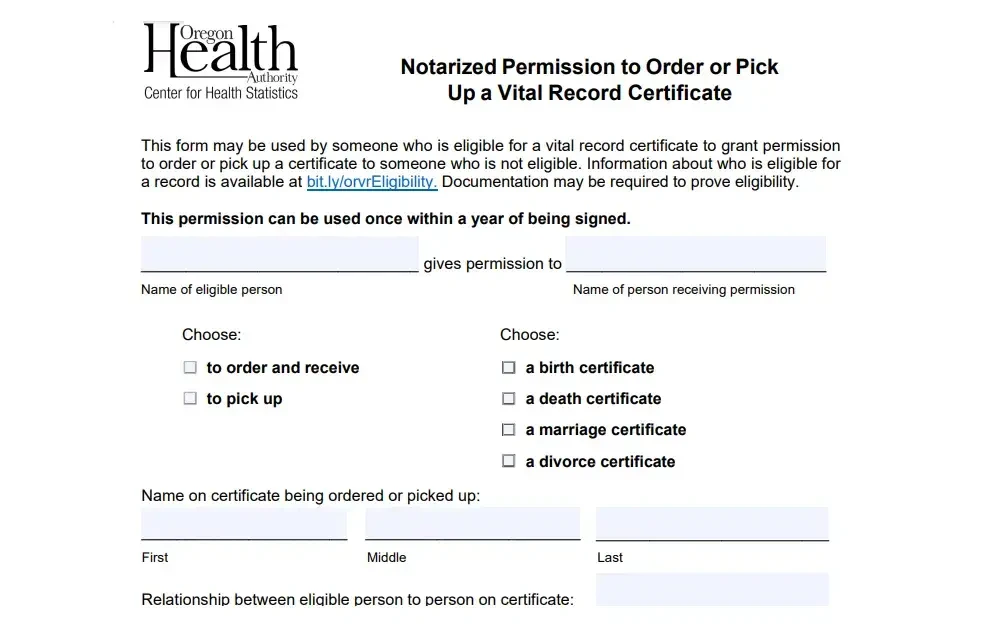
Patrons may request certified copies of divorce records through several means including online requests, by mail and in person. The state agency maintains records from 1925.
Mail Requests: Interested persons can obtain certified copies of separation records via mail by sending a completed divorce record application form (Spanish) or a dissolution of a domestic partnership form with the required information and valid ID.7
Each record costs $25.00 and the same amount for additional copies ordered. If the event year is unknown, applicants will pay an additional $25.00 and an additional $1.00 per year if the search is less than five years Payment is only via check or money order and payable to “OHA/Vital Records.” Applicants should expect their certificates in 7-10 weeks.
Mail the application to the Vital Records Office at the address below:
Oregon Vital Records
Post Office Box 14050
Portland, Oregon 97293
Dropbox Requests: The same process, costs and requirements apply for dropbox requests; applicants can use the information above. However, rather than mailing their application, interested parties will need to drop their application packet at this dropbox location.
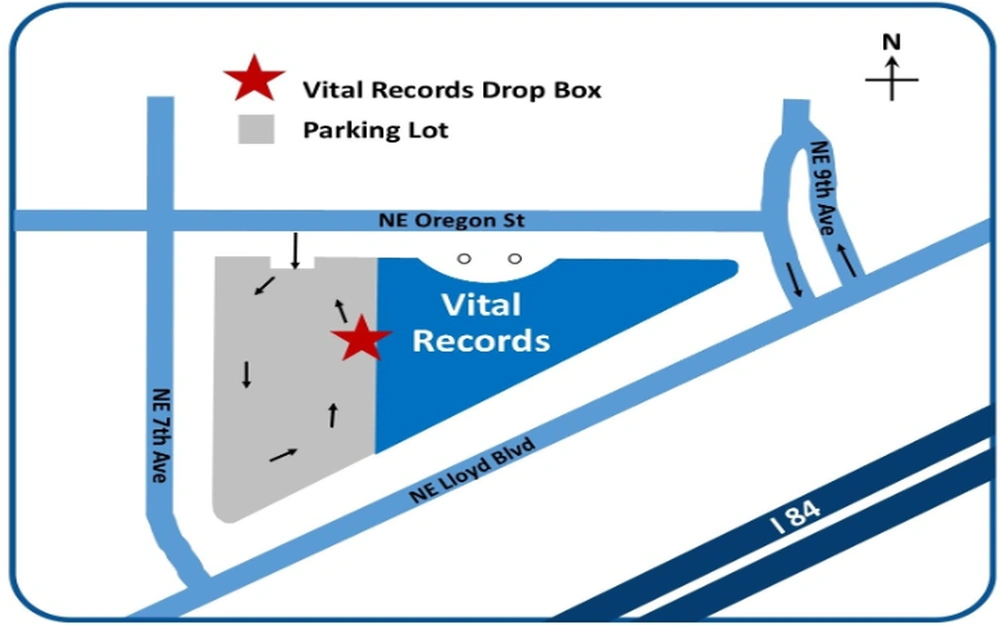
Oregon Vital Records
800 Northeast Oregon Street
Portland, Oregon 97232
In Person Visit: Patrons must set up an appointment when visiting the Oregon Vital Records Office.9 They will need to check in ten minutes before the appointment time. Ensure to bring a valid or alternative identification.
Applicants make orders through a self service kiosk and must supply their Social Security Number (SSN) to prove eligibility.
Records cost slightly more at $28.00 per certified copy and $25.00 for additional copies; the extra $3.00 is an identity verification fee. Applicants can pay by credit/debit card, money order and cash. The Vital Records Office issues certificates the same day, if not they will mail them or can be picked up the next day.
Phone Orders & Online Requests: Online and phone requests are through VitalChek, a third party vendor approved by the Oregon Health Authority.10 Call 1.888.896.4988 for phone orders.
Online and phone orders charge $43.25 and $44.95 respectively for the first certified copy and $25.00 for additional copies on the same order. Payments are through credit or debit cards.
The applicant must furnish their SSN and date of birth (DOB) to perform an identity quiz. They may also need to scan and fax a valid or alternative identification to 1.888.825.3805. Orders are ready within three business days and are subject to additional shipping charges.
Searching Oregon Counties & Cities for Divorce Records
Citizens can search for public divorce records at the county level; in Oregon, dissolution data generated from divorce decrees can be found at the Circuit Courts.
These public agencies have the task of issuing dissolution decrees and are the primary custodians of said records.
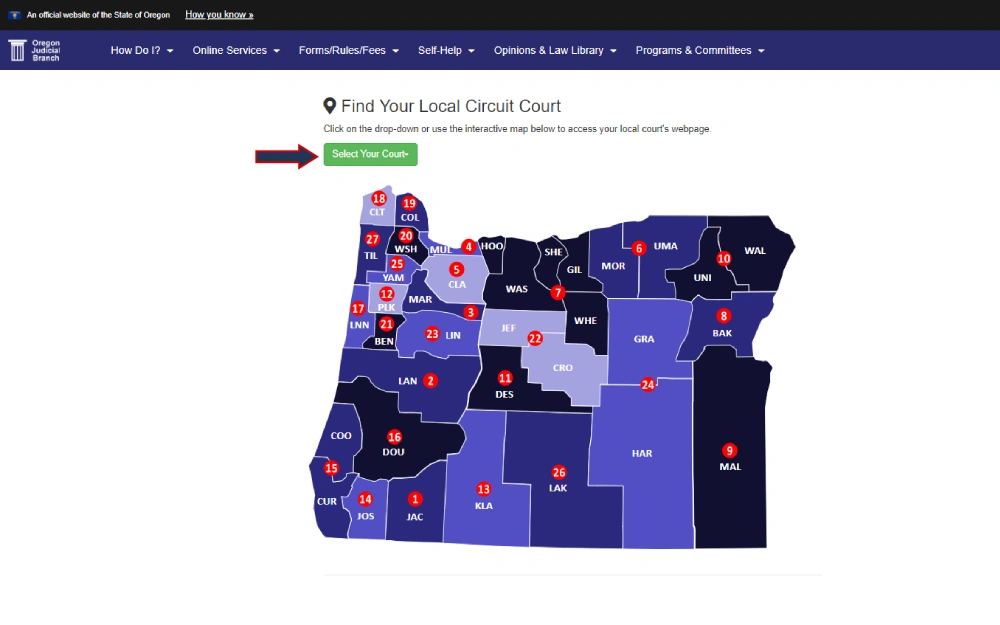
As seen earlier, a state-level request for records provides a broad search for information regardless of county.
However, if the county is known, looking for dissolution records has some advantages—typically, counties serve smaller population segments and therefore process requests quicker. Since they tend to be smaller, they will have attentive staff and several will have online search tools to view and order documents.
To illustrate how to find divorce records at the county level, the three most populous counties will be utilized; they are Multnomah, Washington and Clackamas Counties.
Find Divorce Records in Multnomah County: Patrons may view and request copies of dissolution decrees from the Multnomah County Circuit Court and the Multnomah County Central Library.
Citizens may view these documents through the Multnomah County Divorce Record Search Tool for free. Users may input the name of the party of the record, case number or use the advanced filtering options that allow them to search by location and case type. The Oregon Judicial Department provides this tool and scours records from all circuit courts in the state.
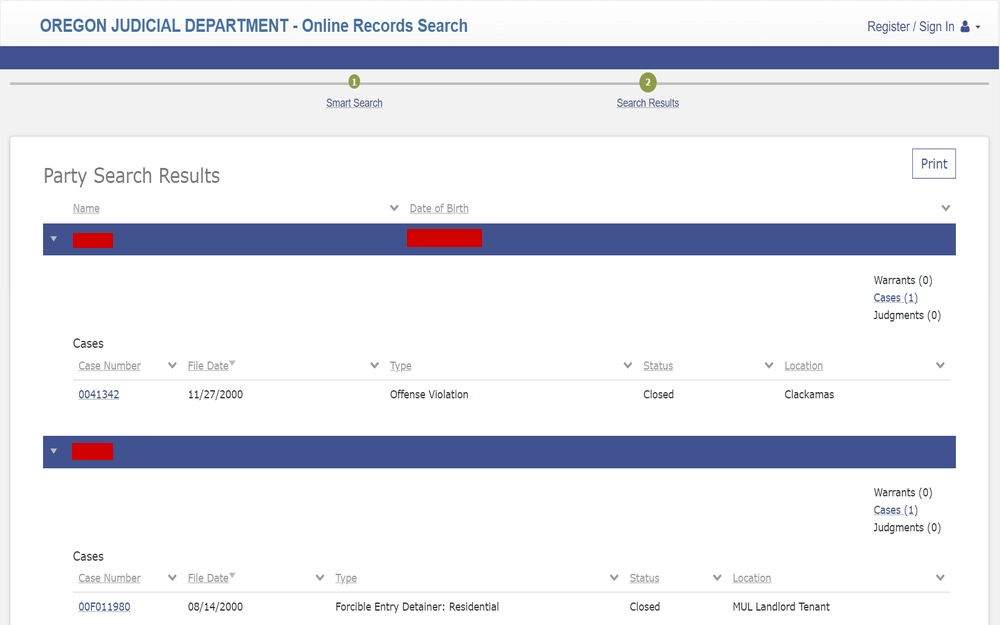
The Multnomah County Circuit Court does not issue certified copies, these will be requested from the State Registrar as seen earlier. Requests for records are made either in writing or in person. Written requests can be performed online or by mailing in a written request; email [email protected] if the case number is unknown.
Costs for obtaining copies can be found on this fee schedule.
The circuit court has records from 1850. Records up to 1983 are available in microfilm; those after 1984 must be requested in advance and in person. Call the Dissolution of Marriage Records Division at (971) 274-0570 for more information on how to request these:
Multnomah County Circuit Court
County Courthouse
1200 Southwest First Avenue
Portland, Oregon 97204
Standard information from dissolution records such as date of the event, names of the parties and the county where the event occurred can be acquired from the Multnomah County Central Library – Records Divorce Index.
Records available are from 1946-2008; to view these documents, call the library at 503.988.5123 or contact the Multnomah County Central Library.
Acquire Dissolution Records From Washington County: Citizens who need to view divorce records in Washington County can contact the Circuit Court. To make requests for divorce records, call the Washington County Circuit Court at 503.846.8888.
As with the Multnomah County, interested parties can execute a free public divorce records search using the Washington County Dissolution Records Search Tool.
Patrons may also acquire Washington County Circuit Court case file copies including divorce records using an online request form. The costs for obtaining these records is in the prior link.
Mail requests should include information such as the party of the record, case number, method of receipt of documents (electronic or hard copy) and type of documents. Include a self addressed envelope and payment in the form of a check made payable to the “State of Oregon.” Mail the application to the address below.
Washington County Circuit Court
Attention: Records Department
150 North 1st Avenue MS 37
Hillsboro, OR 97124
Patrons may make in-person requests at the Washington County Circuit Courthouse in Hillsboro at the address above. The Public Records Review Room is on the first floor of the Justice Services Building in room #110J.
Search for Divorce Records in Clackamas County: Interested persons can either obtain copies of divorce documents from the Clackamas County Circuit Court or the County Records Center—communication with the court will allow applicants to make a determination which agency is holding the file they are looking for.
Patrons may view divorce documents electronically through the Clackamas County Divorce Records Lookup Tool supplied by the Oregon Judicial Branch for free.
Citizens can obtain Clackamas County court records through several ways including electronically, mail and in person requests. Applicants can make an online divorce records request (as seen above in Washington County).
Users will email this form to [email protected] or mail it to the address below. Indicate the case number, names of the party and type of record (certified or exemplified). In person requests may also be made at this address:
Clackamas County Circuit Court
807 Main Street, Room 12
Oregon City, Oregon 97045
Copies cost $0.25 per page, certified copies are $5.00 and exemplified copies incur a $10.00 charge. Documents can either be picked up at the Records Center or applicants may send a check to cover the costs and a self-addressed envelope for return of documents.
Citizens that are in cities will turn to county and state agencies for the record requests. Again, the most populated population centers will serve as examples; they are Portland, Eugene and Salem.
Patrons in Portland will turn to Multnomah County resources outlined above to find records generated in the city and county.
The City of Eugene states that it is not the custodian of divorce records and that citizens will need to contact the Lane County Circuit Court. The same scenario applies to Salem; interested parties can get in touch with the Marion County Circuit Court, as can anyone wanting to access Marion County divorce documents.
City and county residents call view divorce records using the Oregon Judicial Branch case search tool seen earlier. They may also contact the Oregon Health Authority.
Lastly, interested parties may contact third party vendors who may search government databases for divorce records. This introduces an element of privacy since there is no need to contact public agencies directly.
Browsing Divorce Archives in OR for Genealogy Purposes: Free
An important use of divorce records is that they can help individuals perform a genealogy research—interested persons who need to view older documents can turn to the Oregon State Archives, District Courts, the state’s Health Authority and public libraries.
As seen earlier, once divorce records are older than 50 years, they cease to be confidential and become public information.
Archived divorce records can provide important clues to establishing family lineage by knowing who a person’s ancestors were, their offspring and what property they may have had. Divorces were a rare occurrence before the 1900’s especially since no-fault divorces were illegal.
Spouses had to prove that the other partner is the cause for the disagreement, and therefore, dissolutions were not common. Additionally, there was a social stigma attached to divorces, this makes older dissolution records harder to find.
Fortunately, many older divorce documents have been digitized or are in microfilm. Patrons may contact the Oregon State Archives for these archived documents. This agency furnishes several online search tools such as the Oregon Records Management Solution which allows users to locate records via several criteria including any keyword, document content and date created.
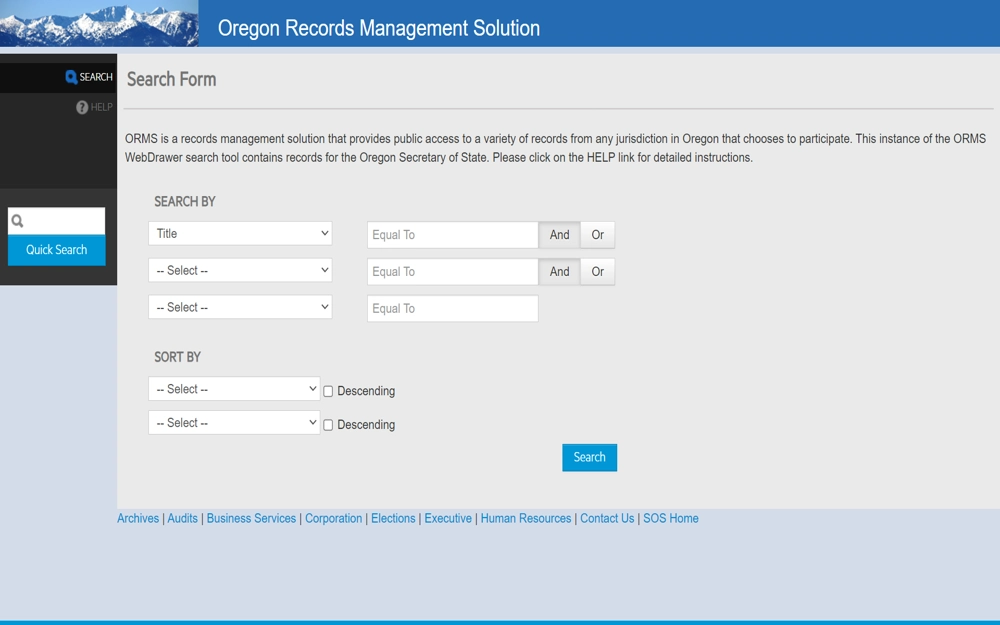
Users may also employ the Oregon Archival Records; in this page they will select the “genealogy records” checkbox. This will lead them to several databases that are free to access and are outlined below.
- Early Oregonians Database—This database allows users to search for documents pertaining to individuals who lived in Oregon prior to statehood up until 1860. It can be queried using name, sex and county.
- Historical Photograph Collections— The historic collections of photographs include more than 10,000 photos from the Salem Public Library, the Oregon State Archives and the Marion County Historical Societies; images are from the mid 1800’s to the 1990s.
- Oregon Historical County Records Guide—This guide is composed of office histories, scenic images and maps. The inventory is drawn from documents located at county offices, museums and the State Archives.
- Oregon Historical Records Index—This is an index of last names (surnames) which is compiled from records at the State Archives.
- Provisional & Territorial Records Guide—Information acquired from this guide are government and territorial records, maps and county histories.
Interested parties may request archived records online or schedule an appointment to visit the OR State Archives in person by calling 503-373-0701 (option 1) or emailing [email protected].
Appointments are available Monday through Friday 8:15 AM to 12 PM and 1 PM to 4:30 PM. Charges for finding and obtaining records are in this fee schedule.
Oregon State Archives
800 Summer Street NE
Salem, Oregon 97310
Patrons can also request online public records to find documents in the custody of the Office of the Secretary of State. Select “divorce of marriage certificate” from the dropdown menu when initiating the request.
County agencies provide an invaluable source for older divorce records—contact the Circuit Court where the dissolution was recorded. Some counties, such as Multnomah County Circuit Court have records that go back as far as the 1850’s.
The Oregon Health Authority can be a source of older divorce records as the county agency has records that go back to 1925.
Archived newspapers can be a potential source of divorce information; the University of Oregon provides digitized historic newspapers by county. Some are free to access, while others incur a charge.
The Library of Congress has a digitized collection of Oregon newspapers from 1861 to current; these can be searched through using keywords. Patrons can view this guide on performing genealogy research at the Library of Congress.
How To Look Up Dissolutions of Marriage & Common Law Divorces in the State of Oregon
Interested parties needing to look up divorce records can contact county agencies—particularly the Circuit Courts. This is especially true because Oregon divorce records are confidential documents that can only be accessed by the public once 50 years has elapsed since the record date.
Circuit court records can be viewed online using a case search tool that the Oregon Judicial Department furnishes. As seen earlier, this tool is free to use and can be queried using a record number, party names or an advanced search. This instrument will allow the public to get details of the dissolution records such as name of the party, county of issue and when the event was recorded.
Common law marriage is not legal in the state of Oregon. This form of marriage happens when two spouses who are eligible to marry live as husband and wife but do not solemnize the wedding with a ceremony or obtain a nuptial license.
Nevertheless, Oregon does recognize couples from common law marriages that have moved from out of state as being wedded; that is if the state where they moved from acknowledged and legalized this form of matrimony.14 This being the case, it is possible for couples who can prove they have a common law marriage to separate by dissolution through the circuit courts.
Contact the respective circuit court to check whether they have conducted and issued dissolution common law divorces on couples from this type of marriage. In scenarios like this, interested parties may find these dissolution records using the same methods as regular marriages.
How To Initiate a Divorce in Oregon & Steps To Take When Served Divorce Papers
Married couples who require to file for divorce in Oregon must fulfill certain conditions before becoming eligible to petition for a dissolution; in any case, all petitions for separations are filed with any of the circuit courts that serve the 36 counties in the state.
To file for divorce in Oregon, one of the partners must have resided in the state for six continuous months pursuant to Or. Rev. Stat. § 107.075—however, a partner who has not consented to a marriage can still petition for an annulment as long as they are a resident of the state.
Oregon is a no fault divorce state, and as such the parties of the dissolution do not need to prove that the other was the cause for the separation such as in cases of adultery or cruel treatment. There is also no need to obtain consent from the other partner to file for divorce in the state.
As with other states, Oregon has two forms of divorces: uncontested and contested dissolutions. Uncontested divorces are quicker and less complicated and occur when both parties agree to matters such as child custody, property division, and alimony (spousal support).
Contested divorces are far more complicated, lengthy and happen when there is a disagreement on the aforementioned issues.
It is always recommended to list the services of legal counsel for divorce proceedings, particularly for contested divorces, as it may prove challenging to fully grasp and understand Oregon law to settle a dissolution successfully.
Uncontested Divorce: Couples may file for this type of divorce jointly or singly since they agree on all the particulars; however, Oregon courts recommend the spouses to enlist a lawyer should they choose to file jointly. The petition is filed in the Circuit Court where either spouse lives.
There are two petitions that are possible; dissolution with children and divorce without children. Other forms that the petitioner will need to file are:
- Confidential Information Form (CIF)
- Notice of Statutory Restraining Order Preventing Dissipation of Assets
- Record of Dissolution of Nuptial or Registered Domestic Partnership
- Summons
- Notice of CIF Filing
Contact the clerk to see if any additional forms are needed; petitioners may also view these instructions on dissolutions with no minor children. The petitioner(s) will need to pay filing fees for the divorce; it is best to confirm what the current fees are at the circuit court.
Individuals who can’t pay for these fees can request a fee waiver by submitting an Application for Deferral or Waiver of Fees & Declaration in Support.
Uncontested divorces typically take three months to compete. Nevertheless, Oregon has a “short-form summary dissolution” which is an expedited uncontested divorce that occurs under certain conditions mandated by Or. Rev. Stat. § 107.485; they include a couple who have been married for ten years, no minor children or neither spouse is pregnant.
This type of divorce takes a few days to several weeks to complete and the couple can finalize the dissolution without appearing in court.
Contested Divorce: Contested divorces occur when one party files for the separation and the forms needed are similar to those in uncontested dissolutions. Once the paperwork is filed, the petitioner will need to provide notice to the ex-husband or wife. The divorce papers are presented in two ways, if the spouse is cooperative, they can sign an Acceptance of Service which means they don’t have to be formally served.
The second option is to hire a sheriff, private process server or someone aged 18 years and older and not party to the case to serve the defendant (spouse). The server must file a Certificate of Service with the court proving they were successful in serving the partner.
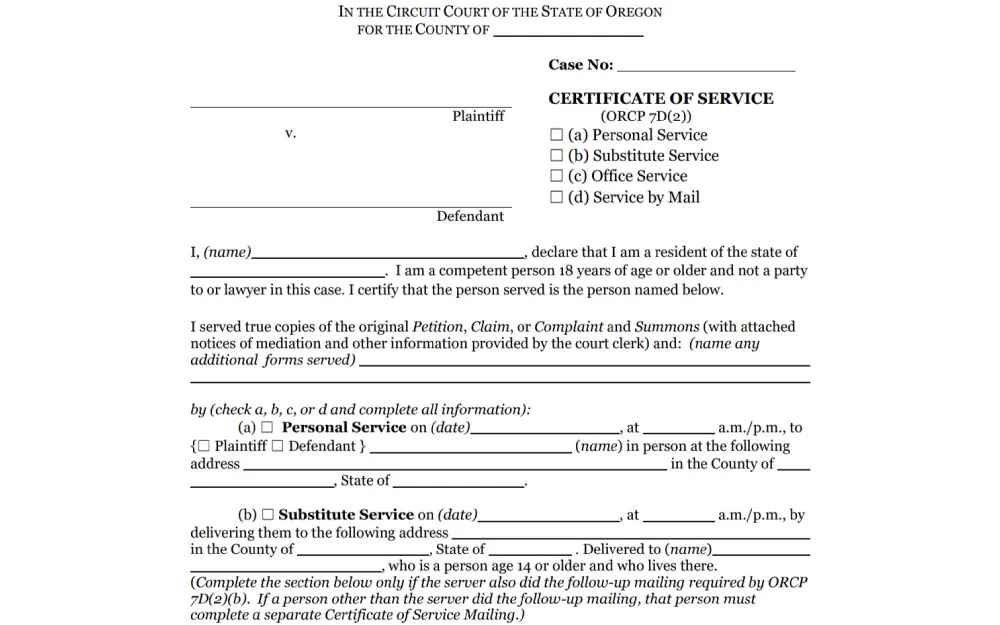
Generally, the issues that the two parties have failed to agree on will be settled by the judge in court. However, the couple can elect to have a mediation overseen by a neutral third party. This is less expensive and complex than resolving the issues in court.
Mediations can be carried out online from anywhere making them convenient. If the mediation is successful, the couple may file an uncontested divorce or short summary separation.
Due to the complexity of contested divorces, they may take six months to two years to complete.
It is important for members of the public to access Oregon divorce records whether they need them to re-marry or adopt; whatever the reason, this resource provides clear and concise instructions to find information efficiently.
Refer to the tutorial on retrieving all free public records in Oregon for similar guidance on accessing warrant details, arrest reports, criminal background checks, court case documents, and more.
References
1Oregon Health Authority. (n.d.). Eligibility to Order a Vital Record. Retrieved December 5, 2023, from <https://www.oregon.gov/oha/PH/BIRTHDEATHCERTIFICATES/GETVITALRECORDS/Pages/Eligibility.aspx>
2Multnomah County. (n.d.). Divorce Records. Retrieved December 5, 2023, from <https://www.multco.us/records/divorce-records>
3Centers for Disease Control and Prevention. (2023, September 12). Oregon – National Center for Health Statistics. Retrieved December 5, 2023, from <https://www.cdc.gov/nchs/pressroom/states/oregon/or.htm>
4Oregon Health Authority. (2023, November 2). Divorce Data and Statistics. Retrieved December 5, 2023, from <https://www.oregon.gov/oha/ph/birthdeathcertificates/vitalstatistics/pages/divorce-data.aspx>
5Oregon Health Authority. (n.d.). Registering Divorce Records. Retrieved December 5, 2023, from <https://www.oregon.gov/oha/ph/birthdeathcertificates/registervitalrecords/pages/divorceinfo.aspx>
6Oregon Health Authority. (2023, September). Notarized Permission to Pick Up Certificate Form. Retrieved December 5, 2023, from <https://www.oregon.gov/oha/PH/BIRTHDEATHCERTIFICATES/Documents/NotarizedPermissiontoPickUpCertificateForm.pdf>
7Oregon Health Authority. (2021, April). Direct Disposition Permit. Retrieved December 5, 2023, from <https://www.oregon.gov/oha/PH/BIRTHDEATHCERTIFICATES/GETVITALRECORDS/Documents/45-16DDP.pdf>
8Oregon Health Authority. (n.d.). Order by Drop Box. Retrieved December 5, 2023, from <https://www.oregon.gov/oha/PH/BIRTHDEATHCERTIFICATES/GETVITALRECORDS/Pages/OrderByDropBox.aspx#dropbox>
9Oregon Health Authority. (n.d.). Schedule an Appointment. Retrieved December 5, 2023, from <https://app.squarespacescheduling.com/schedule.php?owner=23372838>
10VitalChek. (n.d.). Oregon Vital Records. Retrieved December 5, 2023, from <https://www.vitalchek.com/vital-records/oregon/oregon-vital-records>
11Oregon Judicial Department. (n.d.). Oregon Courts. Retrieved December 5, 2023, from <https://www.courts.oregon.gov/courts/pages/default.aspx>
12Oregon Judicial Department. (n.d.). Oregon eCourt Case Information Network. Retrieved December 5, 2023, from <https://webportal.courts.oregon.gov/portal/Home/Dashboard/29>
13Oregon Secretary of State. (n.d.). State Archives Digital Records Search. Retrieved December 5, 2023, from <http://records.sos.state.or.us/ORSOSWebDrawer/Search>
14Oregon Judicial Department. (2010, May). Family Law in Oregon. Retrieved December 5, 2023, from <https://www.courts.oregon.gov/programs/family/selfhelp/Documents/FamilyLawInOregon-English.pdf>
15Oregon Judicial Department. (2022, February). Certificate of Service (Non-Domestic Relations). Retrieved December 5, 2023, from <https://www.courts.oregon.gov/forms/Documents/Gen-Cert_of_Service-non-domrel.pdf>
